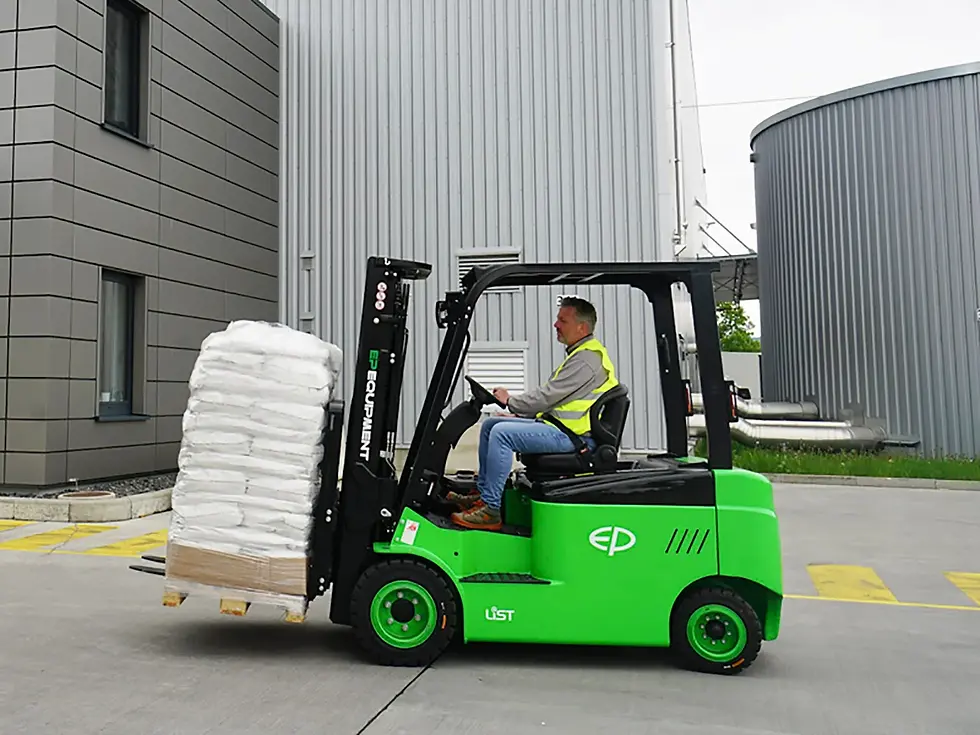The Future of Forklifts
- enquiries9474
- Mar 10, 2025
- 3 min read
The Future of Forklifts: Why Lithium-Ion Batteries Are a Game-Changer
As companies continue to prioritize sustainability, operational efficiency, and cost-effectiveness, lithium-ion powered forklifts are quickly becoming the standard.
In this blog post, we’ll explore the benefits of switching to lithium-ion batteries for forklifts and why this transition is worth considering.
1. Longer Operational Time
One of the standout benefits of lithium-ion batteries is their extended operational time. Unlike lead-acid batteries, which need to be recharged more frequently during the day, lithium-ion batteries last much longer. With a single charge, these batteries can power forklifts for up to 8 hours, often surpassing a full workday of operation.
In comparison, lead-acid batteries typically need a break or a "mid-shift" charge, which can cause downtime and reduce overall productivity. Lithium-ion batteries, however, offer more continuous uptime, leading to fewer interruptions in the workflow and improved operational efficiency.

2. Faster Charging Times
Lithium-ion batteries charge much faster than their lead-acid counterparts. While lead-acid batteries can take 8–10 hours to fully charge, lithium-ion batteries can be fully charged in just 1–3 hours. This reduces downtime significantly, allowing businesses to get their forklifts back to work quickly.
Moreover, lithium-ion batteries are also able to accept "opportunity charging," meaning they can be recharged during breaks or while not in use without negatively impacting the lifespan of the battery. This flexibility is a huge advantage, especially in operations that rely on forklifts running for extended hours each day.
3. Lower Maintenance Costs
Another major advantage of lithium-ion batteries is that they require much less maintenance compared to lead-acid batteries. Lead-acid batteries often need regular maintenance such as water refills, cleaning, and checking for corrosion. In contrast, lithium-ion batteries are virtually maintenance-free.
Since lithium-ion batteries don’t require water refills or the same level of cleaning and monitoring as lead-acid batteries, this saves both time and money. Furthermore, the longer lifespan of lithium-ion batteries also reduces the frequency of battery replacements, leading to significant cost savings in the long term.
4. More Compact and Space-Efficient
Lithium-ion batteries are more compact and lighter than lead-acid batteries, which means they take up less space in the forklift. This allows for more efficient design and can even provide a slight increase in payload capacity, giving operators a higher lifting capacity for the same vehicle size.
In addition to this, the compact design of lithium-ion batteries allows for better utilization of warehouse space. Companies can optimize their charging infrastructure and maximize storage areas, making it easier to store and manage equipment.

5. Enhanced Safety Features
Lithium-ion batteries are inherently safer than lead-acid batteries. They’re designed with advanced safety features that protect against overcharging, overheating, and short circuits. The battery management systems (BMS) built into lithium-ion batteries also monitor performance in real-time, ensuring the forklift operates within safe parameters.
Lead-acid batteries, on the other hand, can be prone to leaks, acid spills, and thermal runaway, all of which can pose safety risks. In high-traffic environments, safety is a top priority, and lithium-ion batteries provide peace of mind by offering safer and more reliable performance.
6. Environmental Benefits
Sustainability is becoming a top priority for businesses, and switching to lithium-ion forklifts is a great step toward reducing your environmental footprint. Lithium-ion batteries are more energy-efficient than lead-acid batteries, meaning they consume less power over their lifetime. They also have a significantly longer lifespan, reducing the number of batteries that end up in landfills.
Moreover, lithium-ion batteries are 100% recyclable, unlike lead-acid batteries, which contain harmful materials like sulfuric acid. By choosing lithium-ion forklifts, you’re not only reducing operational costs, but you’re also contributing to a greener, more sustainable future.
7. Improved Total Cost of Ownership (TCO)
Though lithium-ion batteries come with a higher upfront cost compared to lead-acid batteries, the long-term savings they provide make them a more cost-effective option. With lower maintenance costs, fewer battery replacements, faster charging times, and less downtime, the total cost of ownership (TCO) for lithium-ion forklifts is lower over time.
As businesses continue to push for higher operational efficiency and lower long-term costs, switching to lithium-ion-powered forklifts offers a significant return on investment.
Conclusion: The Clear Choice for the Future
Switching to lithium-ion forklifts is a smart decision for any business looking to optimize their operations. With longer operational time, faster charging, lower maintenance costs, and improved safety, the benefits of lithium-ion batteries far outweigh those of traditional lead-acid options. Furthermore, the environmental advantages and reduced total cost of ownership make lithium-ion forklifts an investment that can significantly improve both your bottom line and your sustainability goals.
In an era where efficiency and sustainability are key, lithium-ion-powered forklifts are leading the way. Embrace the future, improve productivity, and make a positive impact on your business and the environment by switching to lithium-ion forklifts today!
.png)



Comments